U.S. Debt Limit Coming Faster Than Expected

Federal debt hit the allowed limit back in January. Since then, the Treasury has been paying the nation’s bills by using so-called “extraordinary measures” to find money in other places which it can use to keep the government running.
When the Treasury first switched to extraordinary measures, we were told such funding would last until July or August. Last week, however, we were told that such funding is going to run out sooner for a variety of reasons, and the Treasury now believes it will be out of funding sources by the first of June. That’s just three weeks away.
Now if the Treasury runs out of funding, that means it will not be able to pay the nation’s bills on time. If it lasts long enough, the Treasury will have to default on some of our debt. Almost certainly, a default on some of our debt, for the first time ever, would precipitate a financial crisis and chaos in the markets.
The solution, of course, is for Congress to raise the debt ceiling to allow the government to borrow more money. It’s happened dozens of times before and should be a no-brainer – right? Well, not so this time around.
Currently, Democrats and Republicans are at odds over how to raise the debt ceiling. The Democrats insist the Republicans sign onto a bill that simply raises the debt ceiling with no strings attached. The Republicans, on the other hand, are demanding that any increase in the debt ceiling be accompanied by some significant federal spending cuts.
Democrats including President Biden say they will not agree to this under any circumstances including, it is assumed, a debt default. So, unlike debt ceiling arguments in the past, this one clearly holds more risk. And as noted above, we are only three weeks away.
The timetable keeps moving up because some variables are changing. To explain this, we need to back up to last year.
President Biden and congressional Democrats gave the Internal Revenue Service an $80 billion funding infusion in last year’s Inflation Reduction Act to modernize the agency and hire more workers to process returns, cut down on tax avoidance and improve customer service. House Republicans tried unsuccessfully to claw back that money in the first bill passed by their new majority. Now both parties are scrambling to find a way out of a debt-ceiling impasse before June, when the Treasury Department predicts the US will start defaulting on its financial obligations.
It turns out that one surprising culprit behind the sooner-than-anticipated debt-limit deadline is the better IRS service this year, due in large part to the Democrats’ $80 billion in extra funding. The IRS has a much smaller backlog of tax returns to work through this year — about half the 5.2 million piled up at this time last year — so there are fewer checks left to be deposited in the federal coffers.
The fewer payments processed in May, in combination with the lower-than-expected receipts through April, means that the Treasury’s extraordinary measures will be exhausted sooner than previously projected – by early June rather than July or August, the nonpartisan Congressional Budget Office told lawmakers this week.
Better IRS customer service isn’t the only reason the debt ceiling is looming faster than anticipated. Capital gains taxes are lower than expected this year, and the IRS has received 1.3% fewer tax returns overall this year compared with 2022. That could partly be because the department gave people in California and other states hit by natural disasters until October to file their returns.
It’s not uncommon for wealthy people who owe taxes to not only file very late in the tax season but also do it on paper, rather than electronically – because that takes the IRS longer to process, which means the taxpayers’ money can sit in an account longer collecting interest.
For these reasons and others, the Treasury is likely to run out of money around the first of June rather than July or August as earlier forecasted. So far, Congress doesn’t seem overly concerned about it, but that will certainly change very soon.
Republicans and Democrats need to stop squabbling and raise the debt ceiling ASAP. There’s no question it will happen, so why not put the bickering aside and pass something before the financial markets start to freak out?
The debt ceiling will be increased and in time to avert a default on federal debt – I have no doubt about that. Yet it remains to be seen how Democrats and Republicans want to see this play out. As always, it will be interesting to watch.
More By This Author:
Another Debt Ceiling Showdown – They Just Never Learn
Economy On Solid Ground Or Headed For Recession?
Inflation Eases In March, But Still Way Too High



